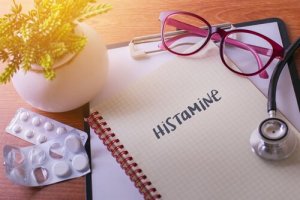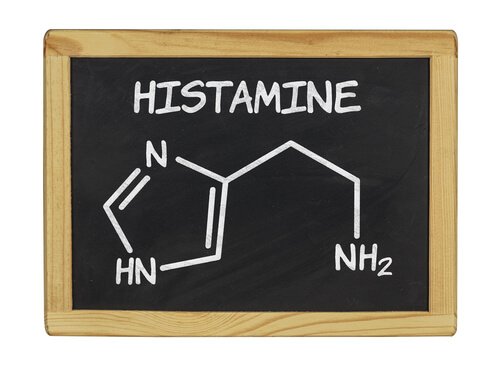What Are Histamines and How Do They Work?

No doubt you’ve heard of histamine or antihistamines before. These two substances are directly related to allergies and allergy treatment. However, you probably don’t know exactly what histamines do or why they can cause such strong reactions to food, plants, or animals.
In this article, you’ll learn about what histamines are and what they do inside your body. You’ll also discover what their relationship to allergies is and how that plays a role in allergic reactions.
What are histamines?
Histamines are molecules that serve a dual purpose. Depending on where they are in your body, they can act as hormones or neurotransmitters. As such, their mission is to regulate your biological functions. They also allow certain cells to share information.
Histamines also play a crucial role in regulating your immune system. They also regulate certain functions in the digestive tract, like producing gastric acid in the stomach.
Not only that, but they’re also important for regulating certain cycles in your body, like your sleep cycle. Histamines help your sleep cycles stay more or less stable. Lastly, they’re related to some parts of the human sexual response.

What produces histamines?
Unlike many other hormones, your body can’t synthesize histamine on its own. It needs histidine, an essential amino acid that your body gets from the food that you eat.
That’s why diet is so important for your body’s production of histamines. You need to eat a protein-rich diet to maintain appropriate histamine levels in your body. Some research suggests that people with diets low in protein could have more allergy problems.
Once you’ve ingested enough histidine, your body produces histamine through a process called decarboxylation. This process happens in two components of the immune system called mast cells and basophils. Because histamines are an important neurotransmitter, certain parts of your brain can also produce this substance.
How histamines affect your body
For hormones and neurotransmitters to work, certain receptors in your body have to absorb them. Scientists have discovered four different types of receptors. They are found all over your body, and each receptor has a different effect.
Some receptors, for example, are in the digestive tract, while others are in the bronchial tubes or the brain. Researchers didn’t discover the last type until recently, so it’s possible that in the near future we will learn about new ways that this hormone impacts the body.
The function of histamine
1. Inflammation
The main purpose of histamine is to cause inflammation in the body. This response helps isolate foreign and problematic agents so the body can fight them off more effectively. The flip side of that is that when the hormone isn’t working properly, it causes allergic reactions.
Vasodilation is the process that causes inflammation. Vasodilation means the widening of blood vessels, which increases the volume of blood in the affected area.
Histamine also attracts white blood cells to the affected area, which causes inflammation, heat, itchiness, and redness. These bothersome symptoms are the price you pay for your body to be protected against foreign agents.
2. Sleep regulation
Histamine has the opposite effect of melatonin in your body. In other words, it’s responsible for regulating activation and wakefulness. In fact, most medications designed to treat hypersomnia (excessive sleepiness) do so by activating the same receptors as histamine.

3. Sexuality
Lastly, histamine is also important for regulating sexual response. In fact, it has a lot to do with orgasm. Several studies have shown that histamine deficiency can lead to anorgasmia. On the flip side, too much histamine tends to cause premature ejaculation in men.
As you can see, histamine is crucial for your physical health and well-being. That’s why it’s so important to maintain a healthy diet and habits that promote histamine production. Your body will thank you for it!
No doubt you’ve heard of histamine or antihistamines before. These two substances are directly related to allergies and allergy treatment. However, you probably don’t know exactly what histamines do or why they can cause such strong reactions to food, plants, or animals.
In this article, you’ll learn about what histamines are and what they do inside your body. You’ll also discover what their relationship to allergies is and how that plays a role in allergic reactions.
What are histamines?
Histamines are molecules that serve a dual purpose. Depending on where they are in your body, they can act as hormones or neurotransmitters. As such, their mission is to regulate your biological functions. They also allow certain cells to share information.
Histamines also play a crucial role in regulating your immune system. They also regulate certain functions in the digestive tract, like producing gastric acid in the stomach.
Not only that, but they’re also important for regulating certain cycles in your body, like your sleep cycle. Histamines help your sleep cycles stay more or less stable. Lastly, they’re related to some parts of the human sexual response.

What produces histamines?
Unlike many other hormones, your body can’t synthesize histamine on its own. It needs histidine, an essential amino acid that your body gets from the food that you eat.
That’s why diet is so important for your body’s production of histamines. You need to eat a protein-rich diet to maintain appropriate histamine levels in your body. Some research suggests that people with diets low in protein could have more allergy problems.
Once you’ve ingested enough histidine, your body produces histamine through a process called decarboxylation. This process happens in two components of the immune system called mast cells and basophils. Because histamines are an important neurotransmitter, certain parts of your brain can also produce this substance.
How histamines affect your body
For hormones and neurotransmitters to work, certain receptors in your body have to absorb them. Scientists have discovered four different types of receptors. They are found all over your body, and each receptor has a different effect.
Some receptors, for example, are in the digestive tract, while others are in the bronchial tubes or the brain. Researchers didn’t discover the last type until recently, so it’s possible that in the near future we will learn about new ways that this hormone impacts the body.
The function of histamine
1. Inflammation
The main purpose of histamine is to cause inflammation in the body. This response helps isolate foreign and problematic agents so the body can fight them off more effectively. The flip side of that is that when the hormone isn’t working properly, it causes allergic reactions.
Vasodilation is the process that causes inflammation. Vasodilation means the widening of blood vessels, which increases the volume of blood in the affected area.
Histamine also attracts white blood cells to the affected area, which causes inflammation, heat, itchiness, and redness. These bothersome symptoms are the price you pay for your body to be protected against foreign agents.
2. Sleep regulation
Histamine has the opposite effect of melatonin in your body. In other words, it’s responsible for regulating activation and wakefulness. In fact, most medications designed to treat hypersomnia (excessive sleepiness) do so by activating the same receptors as histamine.

3. Sexuality
Lastly, histamine is also important for regulating sexual response. In fact, it has a lot to do with orgasm. Several studies have shown that histamine deficiency can lead to anorgasmia. On the flip side, too much histamine tends to cause premature ejaculation in men.
As you can see, histamine is crucial for your physical health and well-being. That’s why it’s so important to maintain a healthy diet and habits that promote histamine production. Your body will thank you for it!
This text is provided for informational purposes only and does not replace consultation with a professional. If in doubt, consult your specialist.







